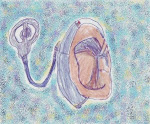 ive but she sure knew how to make herself feel right at home here in Bama. Since moving to Alabama years ago, this volleyball/tennis playing gal has not only been seen eating a fried green tomato but fried okra as well. And now that she's eating for two (again!) you may see her sampling more of what Alabama cuisine has to offer.
ive but she sure knew how to make herself feel right at home here in Bama. Since moving to Alabama years ago, this volleyball/tennis playing gal has not only been seen eating a fried green tomato but fried okra as well. And now that she's eating for two (again!) you may see her sampling more of what Alabama cuisine has to offer.Mandy doesn't quite have the Southern accent down yet but we are working with her on that so hopefully by the time baby number #2 gets here (it's a boy), she'll be speaking right along with her Southern peers. You may find us in the booth working on Spondee words such as "hot dawg". Her receptive skills are fantastic and her speech is bound to catch up sooner or later. She's very proud that she's adopted the word y'all already into her vocabulary. We gave Mandy a Southern Vocabulary test just to see areas that may show weakness and here are the results. Right away Mandy knew the words doohickey saying it was the same as thingamabob and that dad burn it means darn it. However, she did have problems with the word orta, which we all know means should, and the term walla go obviously means a while ago. I did go over the results with her and since we are not bound by HIPPA privacy treaties here at Bama Ears, she does understand the results would be displayed.
We asked Mandy why she chose pediatric audiology and and she claims she loves to work with children. She likes the challenge of working with kids and says it's never a dull a moment when you work in pediatrics. We asked if she had experience working with children with multiple needs as well since almost half of all kids with hearing loss experience other issues also.
"I am fortunate enough to be able to work with children with many special needs. Children with short attention spans are not uncommon in our patient base. We also work with many patients with different syndromes, vision impairments, cerebral palsy, and autism to name a few. This is part of the challenge that keeps me going on a day to day basis. You really have to be patient and creative to get the information and participation you need from any child, then add on an additional impairment other than deafness and the challenges becomes greater. I love my job, and I am blessed that I have the opportunity to make a difference in all types of children's' lives."
We thank Mandy for letting us peek inside her life a bit. When not at the HEAR Center hel
 ping our kids hear better, she's at home with Brian, Lucy, and their two dogs watching Jon and Kate Plus 8 when she's not rocking out to Guitar Hero. This cool mom of soon to be four (if you count her dogs...and she does!) tries to stay current by keeping up with the latest top 10 songs on the radio but she really prefers listening to Billy Joel, Jimmy Buffet, any song from the 80's and Veggietales (a true mom). This audiologist is determined to prove that you don't have to be Bama born to be a Southern girl.
ping our kids hear better, she's at home with Brian, Lucy, and their two dogs watching Jon and Kate Plus 8 when she's not rocking out to Guitar Hero. This cool mom of soon to be four (if you count her dogs...and she does!) tries to stay current by keeping up with the latest top 10 songs on the radio but she really prefers listening to Billy Joel, Jimmy Buffet, any song from the 80's and Veggietales (a true mom). This audiologist is determined to prove that you don't have to be Bama born to be a Southern girl.



















